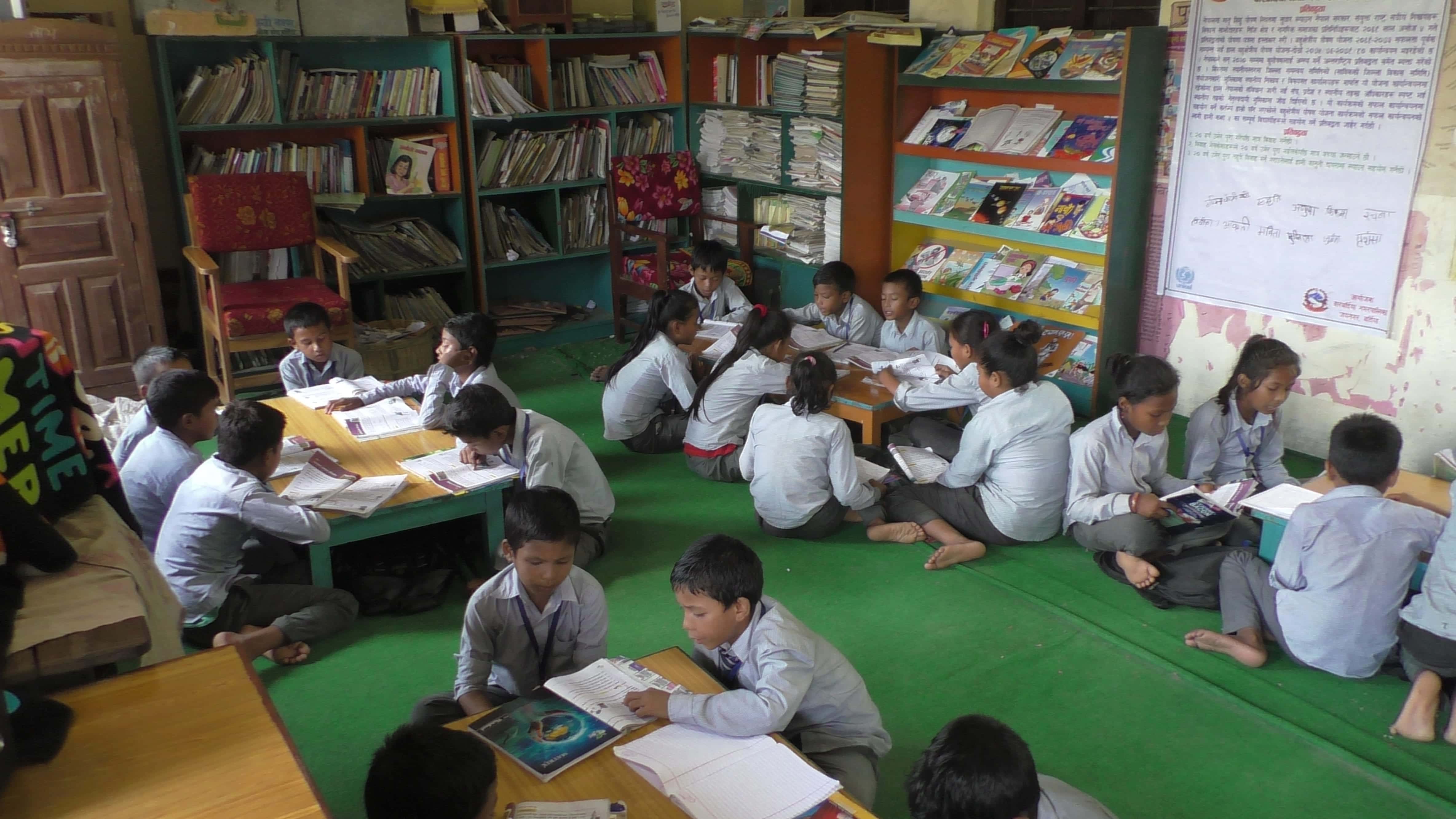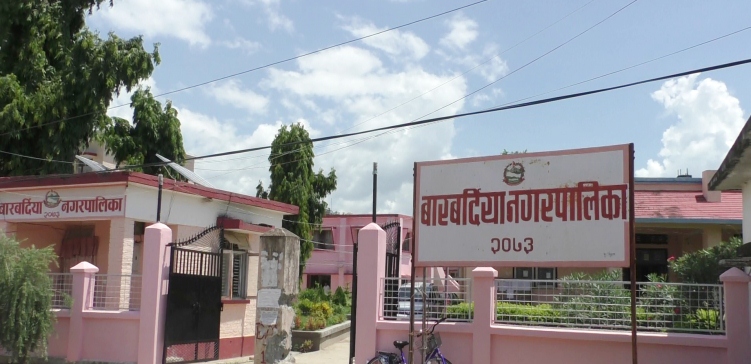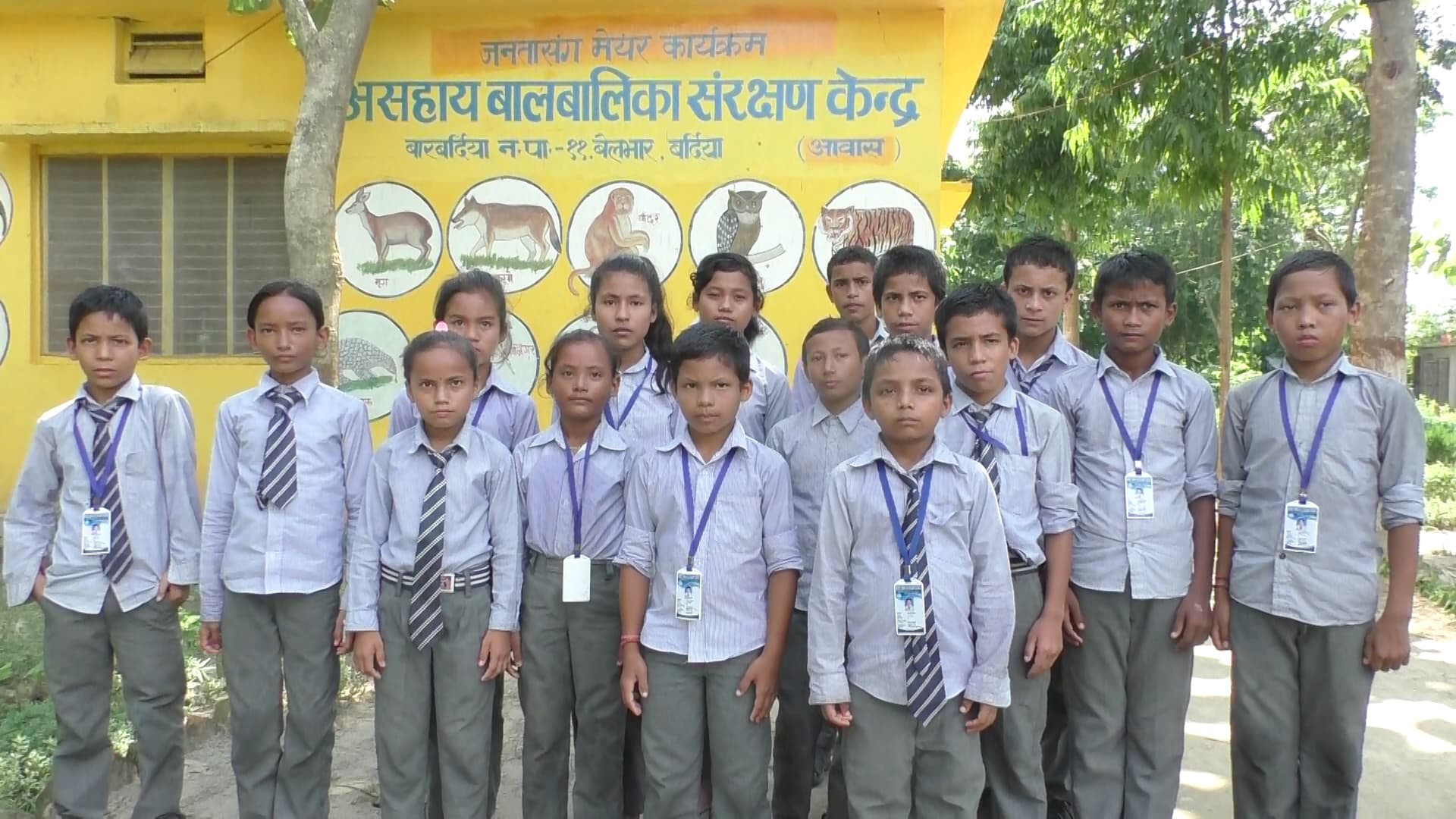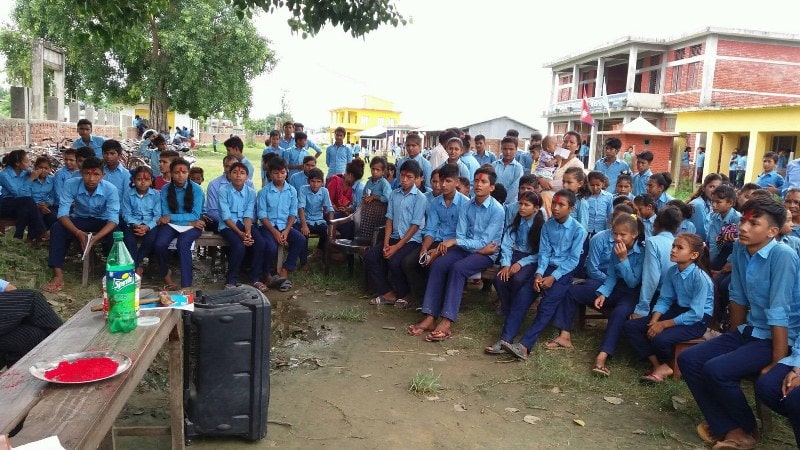Barbardiya Municipality in Bardiya has brought about visible changes in public education. After funding a public education reform campaign by allocating 23 per cent of the total municipal budget, no child in the local federal unit is outside school now.
Krishna Adhikari: Centre for Investigative Journalism-Nepal
The joint manifesto of the now unified CPN-UML and the CPN (Maoist Centre) parties for the 2017 federal and provincial parliamentary elections committed 20 per cent investment in the education sector from the country’s total budget. Post election, the leftist government, however, did not honour its commitment. In the budget for the current fiscal year, the federal government allocated only Rs 163 billion, or 10.63 per cent of the total expenditure, to education.

A class at Simha Secondary School in Barbardiya Municipality.
Barbardiya Municipality in Bardia district, however, set aside 23.22 per cent of its total budget, for education. The share of budget this fiscal year amounts to Rs 41.577 million, out of which Rs 7.5 million will go to polytechnic education and Rs 35 million to public school reform. “Education is an infrastructure of development. Therefore, we’ve invested a big chunk of municipal budget in education.”
The municipality has started reforms with early childhood development, the foundation of education. There are 96 child development centres in the town. The local government has repaired buildings and refurbished classrooms and supplied educational materials.
SLC has been determined as the minimum qualification of child teachers while even those not meeting the qualification used to get the responsibility of looking after the centres. Since the new school year that began seven months ago, the facilitators get a monthly allowance of Rs 2,000 on top of the Rs 6,000 that they had been drawing earlier monthly. According to the education, youth and sports section of the municipality, 2,112 students go to the 96 centres.
Municipal teachers
In the 14 secondary schools, 10 basic schools and 19 primary schools run by the state, a total of 17,593 students have been enrolled. The schools faced a shortage of 117 teachers in total, which had affected teaching-learning activities. Having concluded that learning outcome can’t be improved without well qualified teachers in adequate numbers, the municipality appointed 117 municipal teachers seven months ago. Other municipalities have focused on appointing municipal police but Barbardiya has recruited teachers with its own resources and management. This move has filled the void of subject teachers in the schools.
Mayor Tharu says: “Teachers’ appointment was fast-tracked transparently, brushing aside numerous influences after the written [selection] tests. Education can’t improve without able teachers. I hope the teachers appointed by the municipality are believed to give good dividends to our schools.”
Former Bardiya district education officer Jit Bahadur Shah says there were no anomalies in teacher appointment since the municipality appointed able teachers by conducting the written test and interviews on the same day. Ram Prasad Dhital, vice-chairman of the Teachers’ Federation Barbardiya and headmaster at Janata Secondary School Rambhapur, says the system started at the municipality has put an end to quota sharing and political interference in teacher appointment.
Social studies secondary teacher Jaganath Tripathi, lower secondary English teacher Prashant Timilsena and primary teacher Lal Bahadur Budha, who were appointed by the municipality to Dhital’s school, have also passed the written exams conducted by the Teacher Service Commission. “This is an example of the municipality’s teacher selection process being fair and competitive,” headmaster Dhital says.
Bharbardiya has been the first municipality to ensure teachers as per their quotas. The local unit has signed a one-year contract with the teachers. The main yardstick of their assessment is improvement in instruction at their respective school. One of the main conditions of service is that the recruits will have to make way for the candidates recommended by the Teacher Service Commission for permanent posting.
Article 31 (2) of the Constitution of Nepal recognises education as a fundamental right of citizens, provisioning basic education as free and compulsory and secondary education as free of charge. The government, however, has failed to supply teachers for the sanctioned posts. Since some of the schools have appointed teachers on their own, they charge students to pay for such teachers.

The Barbardiya Municipality Office in Bardiya.
Until the municipality supplied teachers, Janata Secondary School collected nearly Rs 1,200 per student in grades 6 to 10 annually as agreed in the guardians’ assembly. After the municipal teachers took charge last year, the schools in Barbardiya only charge exam fees from students. “The exercise to implement the constitutional provision of free education has started in Barbardiya,” Mayor Tharu says.
Among the 14 secondary schools in the municipality, only five had permanent secondary teachers as headmaster. In the remaining schools, primary and basic level teachers had been made the head teacher. The municipality has adopted the practice of appointing only qualified teachers as the principal. The new local council has signed five-year performance contracts with headmasters on the basis of their work plans.
The new policy gives the headmaster 25 powers besides preparing reports on the performance and conduct of teachers and submitting them to the school management committee, and taking action against negligent teachers. On top of the usual perks of principals, the municipality pays a secondary headmaster Rs 1,000, primary Rs 800 and basic Rs 700 extra every month.
Amar Shahid Dasharath Chand Secondary School Khaireni, Dharmabhakta Secondary School Katarniya, Janajyoti Secondary School Bangai, Janasewa Secondary School Baidi, Kisan Secondary School Phachkahawa, Simha Secondary School Belbhar, Yuwak Secondary School Thanphena, Nepal Rastriya Secondary School Belawabajja and Bhanubhakta Secondary School Siuniya, which had headmasters of basic and primary levels even if they had been running secondary classes, have now got permanent secondary level teachers as principals.
The municipality has also deputed permanent teachers of relevant levels as headmasters to 10 basic and 11 primary schools. Twenty-two teachers have been deputed as subject teachers. Tek Prasad Pande, chief of the education, youth and sports section of the municipality, says these initiatives have improved teaching-learning at the schools.
Hostel for the helpless
Under its Mayor with People programme, Barbardiya Municipality has opened a shelter in Belbhar for poor and orphaned children and made provisions for their education. Six girls and 15 boys have found home in the facility operational since last year. They go to Simha Secondary School in Belbhar. The municipality has taken the responsibility of their education and health. Samjhana Chaudhary, a sixth grader, is happy that the municipality provided guardianship to her.

Poor and orphaned children sheltered in a hostel and educated under the Children with Mayor programme of Barbardiya Municipality.
For providing food and accommodation to the children and morning and evening tuitions, the municipality has managed teacher, warden and assistants. While Rs 2.5 million was spent last year on operating the centre, Rs 1.6 million has been allocated for it this fiscal year. Deputy Mayor Anju Dahit says the municipality will take care of the sheltered children until they reach the higher secondary level.
Technology-friendly instruction has been adopted to boost learning outcome at the schools. Computers, LED television sets and speakers have been introduced to classrooms. Most of the schools have newly set up libraries and laboratories and revamped libraries. Last year, the municipality granted each of the 33 schools between 30,000 and 65,000 rupees to buy equipment such as LED TV and sound system. Since there were problems in running computer classes due to low-voltage electricity, the municipality helped Janata SS Rambhapur to acquire a new transformer.
Process has begun in partnership with the Nepal Telecommunication Authority to establish an information technology lab at Yuwak, Janata and Bhanubhakta secondary schools. Each lab will have 24 computers linked to the internet. According to Mayor Tharu, the municipality has been making efforts at effective teaching-learning through the use of information technology by increasing the access of internet at other schools too.
Back to public schools
With the improvement in public schools, students are coming back from private schools. Since the school year began seven months ago, 75 students have abandoned private schools to join Yuwak Secondary School while 55 students chose Jananta SS Rambhapur for their education. The mayor himself is effortful to lure guardians to send their children to public schools.

Students take part in a debate on the premises of Bhanubhakta Secondary School in Barbardiya.
Mayor Tharu has transferred his daughter Smriti to Bangalamukhi Secondary School from Sunrise Boarding School, Gulariya. Smriti Tharu is a sixth grader. According to Ram Bahadur Tharu, computer operator at the education, youth and sports section of the municipality, nearly 770 students had been shifted to the community schools of Barbardiya from the so called boarding schools.
With an aim to enroll all school-age children to school, the municipality conducted a special enrolment drive last year. Under the initiative, the mayor, deputy mayor, ward chairpersons and members, the chief of the education section and teachers conducted a door-to-door campaign. The campaign helped guardians realize the importance of educating their children. Of the 284 children aged 5 to 12 years found out of school, 263 children have been enrolled to public schools with scholarships while 21 are being educated through the Belbhar shelter.
With 100 per cent enrolment, Barbardiya Municipality has been Nepal’s first municipality to ensure free and compulsory basic education–up to the eighth grade. Making the announcement on July 12, 2018, Education Minister Giriraj Mani Pokhrel said the municipality had done an exemplary work by guaranteeing the fundamental right of basic education for all its children.
In a household survey conducted last year, the municipality found 5,864 individuals as illiterate. In order to make them literate, instruction had been initiated by mobilizing 94 facilitators. After enabling them to do simple reading and writing, preparations are being made to declare Barbardiya a fully literate municipality this year.
There has been a gradual improvement in the academic environment at schools after the interests shown by the people’s representatives following the formation of local governments and their cooperation and facilitation. Students’ attendance has improved after schools started implementing the academic calendar. While the average attendance used to be 75 per cent, that has increased to 85 per cent after implementation of the academic calendar. Ram Prasad Tharu, headmaster at Simha Secondary School, says the dropout rate has also fallen.
According to Pandey, the education section chief, all the schools in Barbardiya open for 220 days a year while classes run for a minimum of 192 days. By improving their learning outcomes, Yuwak, Janasewa and Janata secondary schools and Janashakti Basic School got additional grants ranging from Rs 50,000 to Rs 150,000 from the municipality last year.
In the past educational session, the average learning outcome of the schools was at least over 50 per cent. According to the municipal education section, the average learning outcome in the past academic year was 62.39 per cent at the primary level, 58.27 in grades 6 and 7, 56.13 in grade 8, and 51.49 in grade 9 and the Secondary Education Examination.



